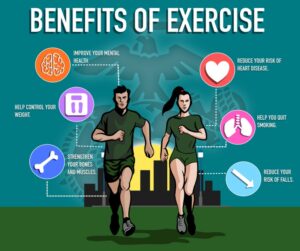fitness lifestyle is important to our healthy lifestyle
To achieve and sustain optimal physical, mental, and social well-being, one must lead a healthy lifestyle. Adopting a fitness-focused lifestyle has many advantages that go well beyond the boundaries of a gym or training regimen in a time when unhealthy behaviors and sedentary lifestyles are becoming common. We will examine the many factors that make leading a healthy lifestyle significant in this in-depth investigation, including how it affects social dynamics, mental health, physical health, and general quality of life.
Physical Health Benefits of a Fitness Lifestyle:
1. Disease Prevention:
Engaging in regular physical activity is essential for preventing diseases. Regular exercise has been linked to a decreased risk of chronic illnesses like heart disease, type 2 diabetes, and several cancers. To preserve cardiovascular health, the American Heart Association suggests engaging in at least 150 minutes of moderate-intensity exercise every week.
2. Weight Management:
Maintaining a healthy lifestyle is essential for managing weight. A balanced diet and regular exercise support people in achieving and maintaining a healthy body weight. This is essential for avoiding health concerns associated with obesity, such as metabolic diseases, joint troubles, and hypertension.
3. Improved Cardiovascular Health:
Running, cycling, and swimming are examples of cardiovascular workouts that improve circulation, lower blood pressure, and boost the circulatory system’s efficiency, all of which are beneficial to heart health. Thus, there is a decreased chance of heart disease and stroke.
4. Enhanced Respiratory Function:
Aerobic workouts enhance respiratory health and lung capacity in addition to strengthening the heart. This supports improved body oxygenation, heightened stamina, and general respiratory wellness.
5. Muscle Strength and Flexibility:
Exercises for flexibility and resistance are essential parts of a healthy lifestyle. They increase the flexibility of joints and encourage the growth of strong, toned muscles. This is essential for sustaining general functional fitness, avoiding accidents, and preserving mobility.
6. Bone Health:
Walking, running, and weightlifting are examples of weight-bearing workouts that are crucial for preserving bone density and avoiding osteoporosis. Such exercises are part of a fitness lifestyle that promotes skeletal health at different phases of life.
Mental Well-Being and Cognitive Benefits:
1. Stress Reduction:
Engaging in physical activity naturally reduces stress. Endorphins are neurotransmitters that are released during exercise and have the ability to elevate mood and reduce stress. Frequent physical activity promotes mental resilience and helps people manage everyday challenges.
2. Mood Enhancement:
Exercise has a significant effect on mental health and mood. Exercise causes endorphins to be released, which results in a happy, euphoric sensation known as the “runner’s high.” Improving one’s mood might help fight off depressive and anxious sensations.
3. Cognitive Function and Brain Health:
Regular exercise may have positive effects on memory, focus, and the prevention of cognitive decline as people age, according to research. The release of neurotrophic factors, which support brain function, is facilitated by physical exercise.
4. Better Sleep Quality:
Higher quality and better sleep patterns are associated with a fitter lifestyle. Regular physical exercise helps regulate sleep-wake cycles, increases relaxation, and adds to a more peaceful night’s sleep.
5. Stress Management:
Engaging in physical activity gives a productive outlet for stress and pent-up energy. Whether via strenuous exercise or relaxing activities like yoga, a fit lifestyle gives people useful tools for managing their stress.
6. Increased Energy Levels:
Contrary to prevalent assumptions, regular exercise enhances energy levels rather than depleting them. Engaging in physical exercise improves mitochondrial function, which raises cellular energy output.
Emotional and Psychological Benefits:
1. Enhanced Self-Esteem:
A healthy lifestyle encourages self-worth and a good body image. Whether the goals are endurance, strength, or weight reduction, setting and completing fitness objectives increases one’s sense of value and achievement.
2. Sense of Purpose:
By creating a workout regimen, people might feel more purposeful and organized. Establishing and pursuing fitness objectives cultivates self-control, tenacity, and an optimistic outlook that transcends the gym.
3. Community and Social Connection:
Engaging in team sports or group fitness activities fosters social contact and a sense of community. The shared experience of pursuing similar fitness objectives promotes comradery and support among participants.
4. Positive Outlook:
Frequent exercise is linked to a more optimistic view on life. An overall positive outlook is influenced by the trifecta of elevated self-esteem, reduced stress, and increased mood.
Social Dynamics and Lifestyle Benefits:
1. Healthy Social Outlets:
Participating in social activities like group fitness classes, sports teams, or fitness clubs is a common aspect of a fit lifestyle. These venues facilitate social contact, which adds to the social and pleasant aspects of exercising.
2. Shared Goals and Accountability:
People may keep each other responsible and discuss fitness objectives when they work out together. Maintaining a fitness regimen can be more consistent and motivated when there is a sense of accountability.
3. Family and Community Health:
Encouraging an active lifestyle in communities and families has a knock-on impact on general health. Physical activity among family members promotes a culture of health and wellbeing that goes beyond individual endeavors.
4. Workplace Productivity:
Businesses that encourage a healthy work environment frequently see increases in output and morale among their staff. Taking pauses for physical activity can improve creativity, attention, and job happiness in general.
5. Healthy Aging:
Healthy aging is largely dependent on leading a fit lifestyle starting in early adulthood. Frequent exercise in later life helps to preserve independence, avoid age-related muscle loss, and retain mobility.
Long-Term Health and Disease Management:
1. Chronic Disease Management:
A healthy lifestyle is frequently essential to managing disease in those with pre-existing medical issues. For illnesses including diabetes, hypertension, and cardiovascular disorders, exercise is recommended as a therapeutic strategy.
2. Reduced Risk of Lifestyle-Related Diseases:
Poor food choices and a sedentary lifestyle are two factors in the increased incidence of illnesses linked to a lifestyle. A fitness-focused lifestyle reduces these risks and enhances long-term health and wellbeing.
3. Recovery and Rehabilitation:
Engaging in physical exercise is essential for the recovery process after operations or accidents. Exercise regimens specifically designed for each patient, under the supervision of medical specialists, promote healing and return function.
Considerations for Adopting a Fitness Lifestyle:

1. Individualized Approach:
Fitness is a personal journey, and there is no one-size-fits-all approach. Individuals should choose activities that align with their preferences, interests, and physical capabilities.
2. Balanced Nutrition:
While exercise is a key component of a healthy lifestyle, it should be complemented by a balanced and nutritious diet. Proper nutrition fuels the body, supports recovery, and maximizes the benefits of physical activity.
3. Consistency and Gradual Progress:
Consistency is paramount in a fitness lifestyle. Gradual progression in intensity and duration of exercise helps prevent injuries and allows the body to adapt steadily.
4. Professional Guidance:
Individuals with pre-existing health conditions or those new to exercise should seek professional guidance. Consulting with healthcare providers, fitness trainers, or nutritionists ensures a safe and effective fitness journey.
5. Mind-Body Connection:
Integrating mindfulness practices, such as yoga or meditation, enhances the mind-body connection. This holistic approach contributes to overall well-being and stress reduction.
Also read this – why physical fitness is important to our healthy lifestyle
Conclusion:
In summary, adopting a fitness-oriented way of life is an investment in one’s present and future, promoting a higher quality of life and overall happiness. As people navigate the complexities of modern living, embracing a fitness lifestyle emerges as a powerful tool for achieving balance, resilience, and fulfillment. The holistic well-being that encompasses physical health, mental well-being, social dynamics, and long-term disease management is enhanced by the multifaceted benefits of regular exercise.




